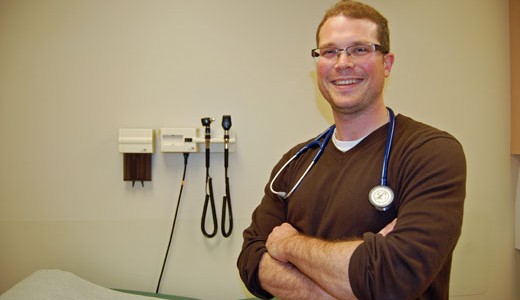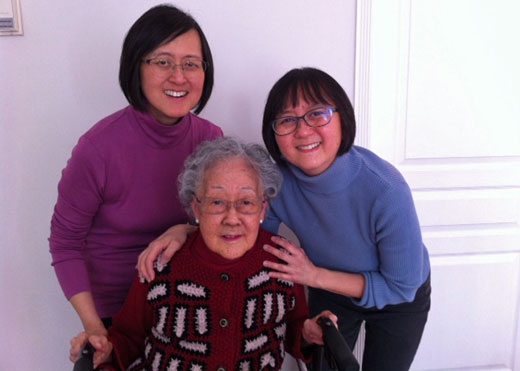“Greg’s the best thing ever to happen to us”
When 96-year-old Muriel Li was referred to a VGH clinical pharmacist, her daughters Marilyn and Linda were nervous.
“Our mom has gone through numerous medications for her high blood pressure over the past 10 years,” explains Marilyn Leung. “Some meds caused many unpleasant side effects — even hospital visits. We were fearful of change.”
Thanks to Dr. Greg Egan, their fears were soon dispelled.
A different perspective
A clinical pharmacist at VGH, Greg assesses patients on the Acute Care for Elders (ACE) unit, patients like Muriel.
“It’s not uncommon to see patients — and caregivers — feeling overwhelmed by meds,” says Greg. “As a profession, pharmacists bring a different perspective to the conversation, and we’re in a position to investigate a patient’s medication regime thoroughly.”
While Greg visited Muriel, Marilyn had many questions of her own. “Finally, I had somebody who could sit down and explain everything I needed to know,” she says. “He was so patient, never rushed me, and he explained everything so clearly.”
To Marilyn’s relief, she learned that her mother could switch her blood pressure medication to Amlodipine — at half the dosage — which would put less pressure on the heart. Amlodipine is also easier to swallow, reducing her mother’s risk of aspirating, a problem that likely contributed to her pneumonia.
New to the Geriatric Rapid Access Clinic
The shift in dispensing responsibilities to pharmacy technicians and assistants has allowed for the expansion of clinical pharmacy services beyond inpatient units. Clinical pharmacists like Greg have joined the multidisciplinary teams in many of our outpatient clinics, including the Heart Failure, Chronic Kidney Disease and Solid Organ Transplant Clinics. Thanks to a pilot led by Dr. Diane Villanyi and Dr. Karen Dahri, the Geriatric Rapid Access Clinic (GRAC) has joined the list.
“We saw an opportunity to provide the GRAC’s patients — all on multiple medications — the in-depth review needed to optimize their medication regimens and decrease their risk of medication misadventures and hospital re-admissions,” says Karen, a clinical pharmacist.
Today, Greg splits his time between VGH inpatient units and the GRAC, where he conducts medication reviews to identify high-risk medications, drug interactions, inappropriate medications and over- and underuse of medications.
“Overuse of medications is the biggest issue for many patients, especially those with chronic, long-term conditions,” says Greg. Overmedication among seniors increases their risk of drug interactions, cognitive impairment, falls, functional decline and adverse drug events. “It can also result in side effects that manifest as new symptoms and complaints that could be interpreted as needing treatment.”
At the GRAC, Greg sees patients referred from the Emergency Department and, on occasion, from family physicians in the community. Most patients — like Muriel — are referred upon discharge from VGH medicine units.
A home visit when in need
Following Muriel’s discharge on January 12, her asthma worsened and she became too weak to attend her appointment at the GRAC. “We almost cancelled the appointment but then I contacted Greg and explained the situation,” says Marilyn. “I asked – fully expecting he’d say no – if he could do a home visit. To my surprise, he said yes!”
During Greg’s visit he reviewed all of Muriel’s medications, one by one, explaining side effects to watch for and discussing the possibility of withdrawal symptoms. “He even reviewed her vitamins with us,” says Marilyn.”
Almost three months on and Muriel’s blood pressure has decreased with no side effects. Her blood pressure hasn’t been this good for more than 10 years.
“It’s a big responsibility to manage our mother’s medicine, and it can often feel very lonely. As a caregivers, it’s been tremendously helpful for us to have this kind of support,” says Marilyn.
“Greg’s the best thing ever to happen to us.”
Related articles
March is Pharmacy Awareness Month
Celebrating Pharmacy Awareness Month


